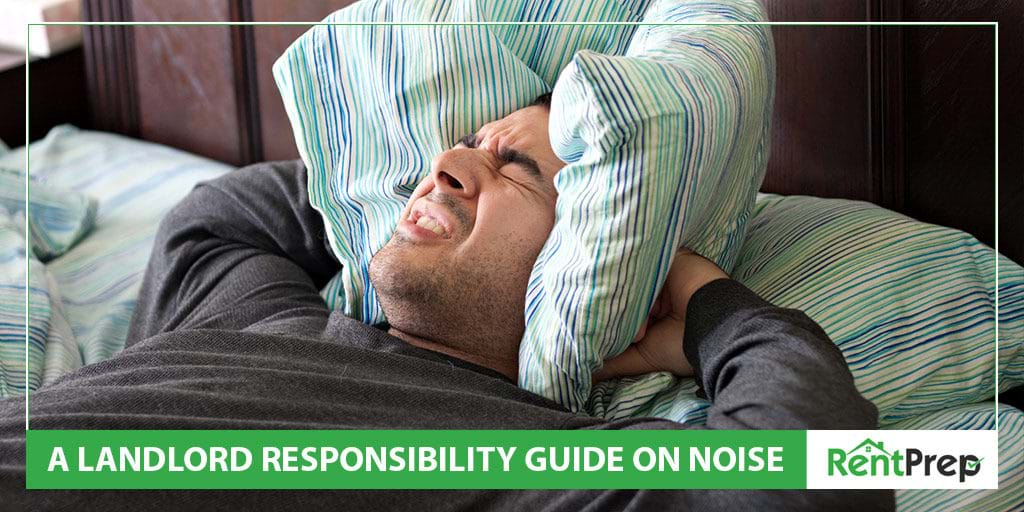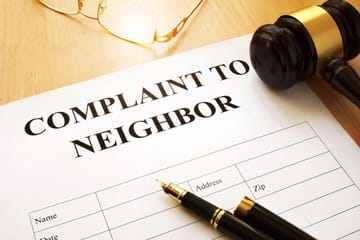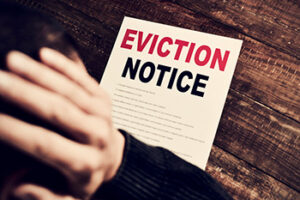
When hanging out at home, nobody likes to be disturbed by things that are outside of their control. We’ve all been in a situation where there’s just too much noise on the street or at our neighbor’s house, and we can’t help but let it bother us!
Tenants living in rental properties and their neighbors are often at a loss for what to do when a noisy disturbance is going on. Can they call the landlord? Should they go next door themselves? Are they allowed to be bothered by the noise at all?
All of these questions may come up, and you as a landlord need to know how to answer them!
Beyond potential tenant questions, it is also important that you understand what aspects of noisy tenants are a landlord’s responsibility to take care of for your own paperwork and organization.
Today, we’ll address the many situations that can arise with noise complaints so that you have a better understanding of how these situations can be handled.
A Table Of Contents For Tenant’s Rights For Noise Disturbances
- What Is A Noise Complaint?
- What Are The Most Common Causes Of Noise Complaints?
- What To Do When You Get A Noise Complaint
- Prevention: Put It In The Lease!
- How Many Complaints Before Eviction?
- Keep The Peace!
What Is A Noise Complaint?
A noise complaint is a complaint that is received by a tenant, neighbor, or landlord whenever someone believes that too much noise is being made. Most of the time, landlords receive noise complaints from tenants about other tenants in shared buildings or from neighbors that live next door to the landlord’s rented property.
Noise complaints can be sent out formally or informally. Sometimes, the complaint will come via a letter through certified mail or even from local law enforcement. At other times, the complaint will be delivered directly and informally.
Regardless of how the noise complaint is received, the key point is that someone believes that there is too much noise happening at one of your properties. What part of that situation is your responsibility to handle?
Is Noise Against The Law?
Before we get into your specific responsibilities as a landlord, let’s talk about noise disturbances more generally. Some people believe that they should be allowed to make as much noise as they want at any time, and they cannot understand how living in a rental can change that.
What these people don’t realize is that noise restrictions are not limited to rentals!
In fact, most towns have some type of noise ordinances that restrict or control the amount of and time when noise occurs. The specific rules in every area are different and based on that community’s rules, but there are rules.
The simple answer is that yes; making too much noise is illegal in some cases.
The Right Of Quiet Enjoyment
When it comes to rentals and other housing, there is a right that tenants and occupants have that is known as the right to quiet enjoyment. In the case of rentals, this means that tenants have the right to enjoy the contracted property as they wish and without unnecessary interruption.
In many cases, the source of noise complaints infringes on this right to quiet enjoyment.
Landlords may be held responsible for resolving noise disturbances when consistent or incredibly loud noises are impeding on a tenant or neighbor’s right to quiet enjoyment, and you’ll want to make sure to address things quickly and efficiently when noise disturbances occur.
What Are The Most Common Causes Of Noise Complaints?
If you haven’t personally dealt with any noise complaints before, you may be wondering what the source of these complaints usually is.
Most noise disturbances are caused by one or more of the following:
- Jumping, running, or stomping upstairs
- Loud television
- Loud music
- Late night parties
- Children crying or playing
- Pet noises
- Yelling
- Excessive noise after 10 or 11 at night
- Outdoor gatherings at the property
- Noise from neighbors’ guests
This, of course, is not an exhaustive list of the various reasons that there might be for a noise complaint. The specific cause of the noise and how often it happens will be an important part of addressing the problem, so be sure to pay close attention to any information you have about the noise’s source.
What Qualifies As Excessive Noise?
It can be very hard to determine what qualifies as “excessive” noise when you are looking at your rental properties. After all, everyone makes noise, and some tenants are going to be more excessive to noise than others. Whether you’re walking around, opening your cabinets, or cooking dinner, some type of noise is going to be made.
It is important to balance out the distinction between normal and excessive noise so that there are as few questions as possible about what noises are excessive.
When a noise complaint comes in, you will need to take the time to determine if the noise falls into the category of “daily life noise” or “excessive noise.” By discerning where on the scale the complaint sites, you’ll be better equipped to handle the situation moving forward.
What To Do When You Get A Noise Complaint
 Now that you know a little bit more about noise complaints and what usually causes them, let’s talk more about how to take on the problem in a confident, quick, and effective way. Remember, dealing with noise complaints needs to happen quickly so that the problem isn’t exacerbated!
Now that you know a little bit more about noise complaints and what usually causes them, let’s talk more about how to take on the problem in a confident, quick, and effective way. Remember, dealing with noise complaints needs to happen quickly so that the problem isn’t exacerbated!
Step 1: Investigate
The first thing that you should do when you receive a complaint is to investigate. It is your responsibility to figure out what is going on, what is the source of the noise, who is being complained about, and how can things be remedied. To figure this all out, you will need to do some investigating!
First, talk to the person who sent in the complaint to be sure that you are clear on the following information:
- What type of noise was heard?
- When did it happen?
- How long did it last?
- Has this happened before?
- Do you/they have any evidence (i.e., an audio recording) of the noise?
- Have you talked to the tenant making the noise?
Gathering all of this information will help you to get the basic information that you need to talk to the tenant that is making noise.
Step 2: Address The Tenant
Once you’ve gathered information, it’s time to talk to the person who may be the source of the noise. Explain to them that you received a complaint about noise, and find out what they have to say about it.
The Tenant Didn’t Realize
In some cases, your tenant may not have realized that they were being loud or causing any type of disturbance. Your problem may be easily resolved if that is the case. Ask the tenant to be more mindful in the future, and you shouldn’t have to address them about this again.
The Tenant Disagrees
In other situations, however, the tenant will be unapologetic or sure that they were not causing too much noise. This situation is going to be trickier to navigate. Take time to hear their side of the story and find out their perspective.
From here, you’ll want to talk to some other neighbors or tenants in the building if there is anyone else around. Without giving any specific information away, find out if anyone else has been hearing the same noises as those who placed the original complaint. Doing this will help you find out if it was a one-time issue or a chronic problem.
Step 3: Options
Based on the information gathered in Step 1 and the perspective gained about the situation in Step 2, you should have a pretty good idea about whether the tenant is too loud or if the complaint was not necessary.
If the tenant needs to do a better job of controlling their noise level in the future, you will want to give them a warning and guide their behavior in a relaxed and communicative way. Let them know what is expected of them and what will happen (see below) if they do not change their ways.
If the complaint seems to be due to sensitivity rather than a genuine problem, speak with the person that submitted the complaint. Let them know that you completed a thorough investigation, and that while the tenant will be careful to not be too noisy in the future, they also need to consider what amount of noise is to be expected from the close living situation.
Step 4: Cure Or Quit
Some tenants will never learn how to keep it down, and you may need to take more serious action(s) in order to improve their behavior.
Because noise disturbances are technically a lease violation, it is possible to send out a cure or quit eviction notice to tenants causing excessive noise. If they do not improve their behavior in the timeline listed in the notice, they can be asked to leave the property entirely.
This is definitely a last resort option that most landlords do not want to end up needing to deal with. In some cases, however, evicting a loud tenant that is causing grief in a multi-unit building is a better choice than risking respectful tenants or your reputation.
The Eviction
To move forward with eviction, you will need to send out a tenant noise complaint letter which clearly explains the problem to the tenant. The letter should also let them know what, if anything, they can do to remedy the situation.
Prevention: Put It In The Lease!

To ensure that you can smoothly move through the steps outlined above, you will want to make some changes to your lease to include information about noise, excessive noise, and what will happen if repeated disturbances occur.
We recommend adding a clause to your rental leases which specifically addresses what will happen if the tenant creates consistent loud or disruptive noises. As with all clauses, the more detailed the language used, the better!
You will often see this part of the lease referred to as the right to quiet enjoyment clause. This clause applies to tenants for their own enjoyment, and it also requires tenants to respect the rights of others to enjoy quiet enjoyment at home!
Quiet Hours
If you are managing a multi-unit building, you will want to consider adding specific quiet hours or rules for times of the day or common spaces where noise can easily be transferred from one unit to another. Adding a complete clause for these rules in the lease is a great way to enforce this behavior from day one.
By including these behavioral guidelines from the beginning, it will be easier for tenants to learn how to be respectful of the others living in the building.
How Many Complaints Before Eviction?
The specific amount of time that a tenant must be given to improve their behavior or leave the property completely is going to depend on the local and state eviction laws in effect at that property. Generally, you will need to give at least two warnings before you can move to eviction.
There is not a specific number of complaints that must be met in order to warrant the eviction process to begin. Instead, the main point to consider is the severity of each complaint and the tenant’s response to those complaints.
Keep The Peace!
Are noisy tenants a landlord’s responsibility? In the sense that it is part of your job to figure out how to proceed with complaints and disturbances, they are indeed one of your many responsibilities.
It is up to you to:
- Investigate complaints
- Talk to the tenant being noisy
- Offer options and solutions
- Start the eviction process, if necessary
If your tenant is causing enough of a disturbance to break local ordinances or even be fined for their volume, it will be on them, not you, to settle those things. While it is your job to try to mediate and remove any problem tenants, facing the punishment for any laws they break are still their own problems to deal with.

